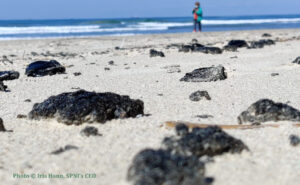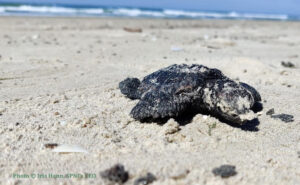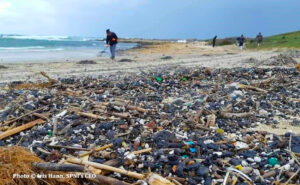In February 2021, over 1200 tons of tar washed up across more than 160km of coastline in Israel’s Mediterranean coast from Rosh Hanikra to Ashkelon, following a heavy storm and unusually high waves. Israel’s Nature and Parks Authority called the spill “one of the most serious ecological disasters” in the country’s history. The tar from the oil spill smeared fish, turtles, and other sea creatures. Today, following intense clean-up activities, the sandy beaches are almost completely cleaned from tar, while the rocky habitats still need further cleaning.
Few days later, the spill had spread to southern Lebanon, where clumps of tar contaminated beaches stretching from the border town of Naqura to the southern city of Tyre. The Tyre Coast Nature Reserve, one of the country’s last remaining sandy beaches and an important nesting site for endangered loggerhead and green sea turtles, was included in the Specially Protected Areas of Mediterranean Importance in 2012.
In both countries, thousands of members of civil society organisations and the public rushed to participate in clean up activities. Several were hospitalized due to toxic fumes from the tar. Among them were MIO-ECSDE members: EcoOcean, Society for the Protection of Nature in Israel (SPNI) and Human Environmental Association for Development (HEAD).

Photo Credit: Iris Hann, SPNI’s CEO
EcoOcean
In 2008 a National Contingency Plan for Preparedness and Response to Combating Oil Pollution Law was drafted but was never enacted. So, in 2017 and understanding the need to be more prepared for a potential Oil pollution disaster, EcoOcean set up the National Network of Sea Emergency Volunteers in coordination with the Ministry of Environmental Protection.
EcoOcean reacted immediately in response to the incident by:
- Mobilizing the Mediterranean explorer (Medex), a vessel equipped for marine research;
- Dispatching 250 trained volunteers of the National Network of Sea Emergency Volunteers;
- Coordinating, through EcoOcean’s Command Center, the clean-up efforts between the Ministry of Environmental Protection, local municipalities, Israel Nature and Parks, NGOs, the general public and the business sector.
EcoOcean’s future planned actions are:
- Establishing a National Rocky Habitat Emergency Cleanup Unit comprised of specialized volunteers in cleaning rocky habitats. Rocky habitats contain rich ecosystems; they are very vulnerable to stresses such as tar pollution and their porous structure makes it very difficult to clean without damaging the biota.
- Recruiting and training more “first responder” volunteers for the National Network of Sea Emergency Volunteers across the 22 Israeli coastal municipalities.
- Activating an Oil Pollution Monitoring Program using EcoOcean’s Research vessel “the Medex”, and the extensive and already existing marine citizen science unit on the Israeli coast for reliable data collection that can be used by the government to devise a feasible rehabilitation plan.
Society for the Protection of Nature in Israel
The Society for the Protection of Nature in Israel (SPNI), in reaction to the spill, took part in the clean-up activities and managed information posts in several beaches to support the volunteers.
SPNI’s future planned actions are:
- Advocating, in collaboration with other organizations, for legislations that protect Israel’s economic waters (or EEZ, Exclusive Economic Zone), that promote proper and sustainable management of Israel’s EEZ and that take into account the environmental aspects.
- Advocating against the Europe-Asia Pipeline Company, Ltd. (EAPC)’s agreement that dictates oil tankers to unload at the Gulf of Eilat to prevent the occurrence of another ecological disaster affecting the reefs of the Gulf of Eilat, the only coral reefs in Israel.
Human Environmental Association for Development
HEAD promptly mobilized its volunteers to participate in the clean-up activities in Lebanon. HEAD is planning more cleaning activities in May, in collaboration with Legambiente (another MIO-ECSDE member organization based in Italy), municipalities, the private sector, the public sector, scouts and schools. Following a second storm in March tar accumulated in new beaches as well as in already cleaned ones.
Read in French here


